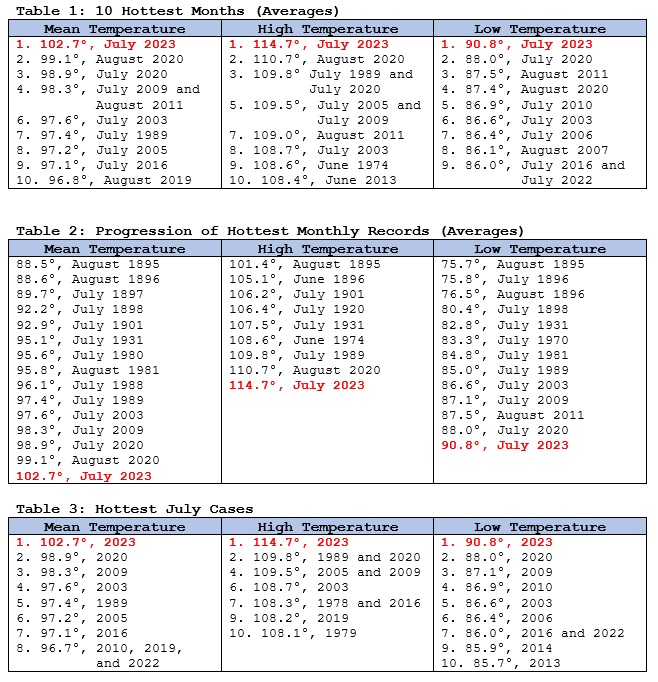PRINT AS PDF
Powered by a heatwave without precedent—christened “Heatwave Chevron” by former Weather Channel meteorologist Guy Walton—Phoenix experienced its hottest July and month on record. The dynamic city of 1.625 million spent day after day under a broiling sun in a raging storm of brutal, unforgiving, penetrating heat. Nights offered little relief from the fierce heat.
As a result, July 2023 left the prior hottest month, August 2020, in the dust much as Secretariat demolished the field in the 1973 Belmont Stakes. July 2023 surpassed the previous monthly mean temperature record by the largest margin by which any prior mark was surpassed. Phoenix also recorded the highest mean temperature and highest average low temperature for any month in any American city. The old records were a mean temperature of 102.2° and an average low temperature of 90.1° in Lake Havasu City during July 1996. Lake Havasu City also had an average high temperature of 114.4° during July 1996. Further, the lowest maximum temperature during July was 108°, which easily eclipsed the 104° mark from June 2013.
Anthropogenic climate change is driving a warming of Phoenix’s summers. This ongoing warming is a global phenomenon with 98% of the world having experienced its warmest 51 years during the current 2,000 years. The IPCC’s Sixth Assessment Report found that heat and heatwaves are increasing on every continent. The primary driver is human-caused climate change. Phoenix’s unprecedented heatwave and record hot month are the result of a combination of factors that includes climate change, which has boosted temperatures and led to “stuck” patterns, the Urban Heat Island Effect, which has raised nighttime temperatures, and the synoptic pattern in which a powerful heat dome developed over the region.
The World Weather Attribution (WWA) Initiative found that the heatwave was “virtually impossible” without climate change and that temperatures were approximately 2°C (3.6°F) warmer on account of climate change. Event attribution studies calculate whether and the degree to which an event was made more (or less) likely and/or intense because of climate change.
The WWA warned, “Unless the world rapidly stops burning fossil fuels, these events will become even more common and the world will experience heatwaves that are even hotter and longer-lasting.” Heatwaves of the magnitude of the 2023 heatwave could occur every 2-5 years in a world that is 2°C (3.6°C) warmer than the pre-industrial world.
The record-setting summer of 2020 was a “summer from the future,” as it resembled the kind of summers that will likely occur on a regular basis by 2050. Similarly, the great 2023 heatwave can be said to be a “heatwave from the future.” On account of the unparalleled heatwave, July went on to become Phoenix’s hottest month on record, by far. In her poem, “Heatwave…Pleiades,” Elizabeth Squires wrote of a heatwave “hotter than Hades… haranguing us from dusk to dawn.” That was Phoenix in July 2023.





As a result, July 2023 left the prior hottest month, August 2020, in the dust much as Secretariat demolished the field in the 1973 Belmont Stakes.